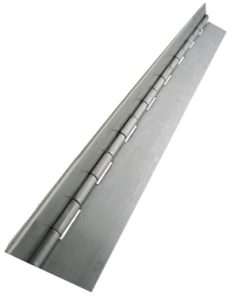
When choosing hinges for a humid or moist environment, you should consider the degree to which it’s protected from corrosion. Most hinges are made of metal. Exposure to moisture can trigger oxidation that degrades or destroys the hinge. Some hinges, however, are made of a corrosion-resistant material that can withstand moisture.
#1) Stainless Steel
Stainless steel hinges offer a high level of corrosion resistance. They are available in different styles, such as butt, loose joint and weld-on. You can also find them in different sizes. Regardless, all stainless steel hinges are made of the iron alloy of their namesake. Consisting of iron with at least 10.5% chromium, stainless steel will develop a thin layer of oxide on its surface. This layer will shield the underlying iron from environmental moisture so that it doesn’t rust.
#2) Brass
Brass hinges are rust resistant. Since they don’t contain iron, they can’t rust; only iron and iron alloys have the potential to rust. Brass hinges can still corrode, but they typically corrode much slower than plain iron or high-carbon steel. In addition to rust-resistant properties, brass hinges are aesthetically pleasing. They feature a light brown or tan color that looks amazing when used on doors, cabinets and other surfaces.
#3) Aluminum
If you’re worried about rust, you can’t go wrong with aluminum hinges. Aluminum is a lightweight and ductile metal. Accounting for roughly 8% of the Earth’s crust, it’s also a readily available metal. Aluminum isn’t as strong as steel, but it’s completely immune to rusting. There’s no iron in aluminum, so hinges made of aluminum can’t rust. Aluminum can still corrode, but corrosion will typically result in the formation of a thin oxide layer over that further protects the aluminum from deep-penetrating corrosion.
#4) Electrogalvanized
Electrogalvanized hinges can withstand humidity and moisture without rusting. They are characterized by a special plating process that protects them from rust and corrosion. Known as electrogalvanization, this process involves the application of a zinc layer. A standard hinge — typically steel — is submerged in a solution of saline and zinc. As electricity runs through this solution, a layer of zinc forms over the surface of the hinge. This layer will shield and protect the hinge from oxidative stress.
#5) Plastic
You might be surprised to learn that some hinges are made of plastic. Living hinges, for instance, typically consist of a single strip or piece of flexible plastic. They are commonly used on bottles and packages. Whether it’s a living hinge or a traditional hinge, though, it won’t rust if it’s made of plastic, nor will it corrode.
